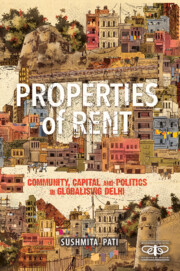Book contents
- Frontmatter
- Contents
- List of Maps and Figures
- Acknowledgements
- List of Permissions
- List of Abbreviations
- Units of Measurement
- Maps
- Introduction
- 1 Creating Values of Land: Law, Records and Kabza
- 2 From Buying Land, Owning Taxis to Becoming Landlords: The Changing Economic Landscape of Villages
- 3 Villages of the City: Ordering Spaces and Aspirations in Neoliberal Times
- 4 In the Shadows of the State: Community as a Mode of Political and Economic Organisation
- 5 Culture, Gender and Belongingness? City and the Violence of Rent
- 6 The Fringes of the Cartel: How the Marginalised Become Landlords
- 7 The Allure of Politics: The Candidates, the Cadre and the Euphoria of Elections
- Epilogue
- Glossary
- Bibliography
- Index
1 - Creating Values of Land: Law, Records and Kabza
Published online by Cambridge University Press: 31 March 2022
- Frontmatter
- Contents
- List of Maps and Figures
- Acknowledgements
- List of Permissions
- List of Abbreviations
- Units of Measurement
- Maps
- Introduction
- 1 Creating Values of Land: Law, Records and Kabza
- 2 From Buying Land, Owning Taxis to Becoming Landlords: The Changing Economic Landscape of Villages
- 3 Villages of the City: Ordering Spaces and Aspirations in Neoliberal Times
- 4 In the Shadows of the State: Community as a Mode of Political and Economic Organisation
- 5 Culture, Gender and Belongingness? City and the Violence of Rent
- 6 The Fringes of the Cartel: How the Marginalised Become Landlords
- 7 The Allure of Politics: The Candidates, the Cadre and the Euphoria of Elections
- Epilogue
- Glossary
- Bibliography
- Index
Summary
Munirka ki mahilaon ko Pakistan bhej dena chahiye. Gobar paat paat kar hi adhe Pakistan par kabza kar lengi.
—Local jokeWhat we call land is an element of nature inextricably interwoven with man's institutions. To isolate it and form a market for it was perhaps the weirdest of all the undertakings of our ancestors.
—Karl Polanyi, The Great TransformationFour hundred square yards of land in Mohammadpur-Munirka, owned by a Murli Manohar and a Gordhan Dass, was set to be acquired around 1989. The brothers decided to put up a fight and file a counter claim under Sections 9 and 10 of the Land Acquisition Act, 1894, of 1 crore rupees as compensation, in addition to solatium and interest. The land acquisition collector knew the drill by then. The formula of coming to a just compensation had evolved to calculating average land prices for the last five years before the land had been notified. According to the collector, most of the land sales had happened in 1984 and the average price was 44 rupees per square yard. No sale was reported during 1985–87. The collector noted, however, that in 1988, one sale had taken place for 1,900 rupees per square yard. On this issue, the collector writes,
There has been increases in prices of land from time to time but no reliance can be placed on the solitary sale deed executed from the year as the prices would not have jumped so much from Rs. 44 per sq. yard to Rs. 1900 per sq. yard during a span of 4 years.
Therefore, 1984 prices of 44 rupees per square yard were held as the baseline for calculating land values in 1989. The brothers were only awarded 39,901 rupees as compensation at the rate of 65 rupees per yard. The hike in 1988 was brushed off as bewildering. The collector saw nothing that could possibly explain why land values could go up so much.
What could possibly have led to such price hikes is anybody's guess. The 1980s was a phenomenal period in Delhi's urbanisation. The 1982 Asian Games, the 1984 Sikh Riots and the construction of a new airport terminal in 1986 presumably created heavy incentives for quick land deals at speculative values in this decade. The land acquisition awards attempted to remain silent on these urban developments.
- Type
- Chapter
- Information
- Properties of RentCommunity, Capital and Politics in Globalising Delhi, pp. 33 - 58Publisher: Cambridge University PressPrint publication year: 2022

